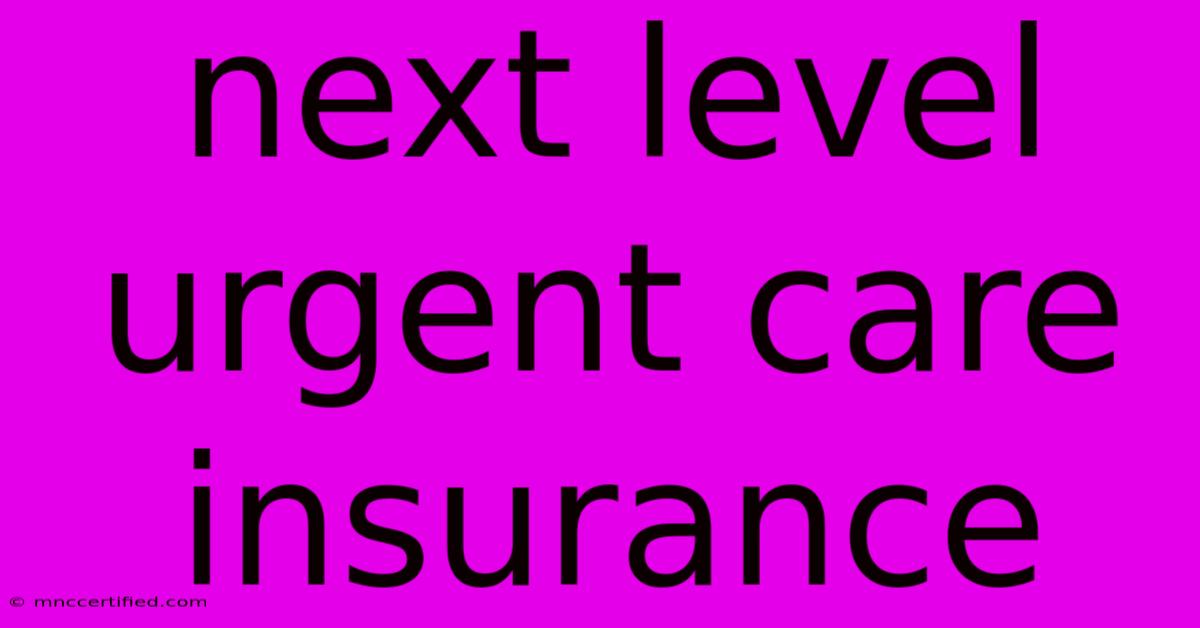Next Level Urgent Care Insurance

Table of Contents
Next-Level Urgent Care Insurance: Navigating Costs and Coverage
Urgent care visits can be a lifesaver when you need immediate medical attention but don't require a trip to the emergency room. However, the cost of these visits can be surprisingly high, making understanding your urgent care insurance coverage crucial. This article will delve into the intricacies of urgent care insurance, helping you navigate costs and ensure you receive the best possible care without breaking the bank.
Understanding Your Urgent Care Insurance Plan
Before your next urgent care visit, familiarize yourself with your health insurance plan's specifics. Key factors to understand include:
-
In-Network vs. Out-of-Network Providers: Visiting an in-network urgent care center significantly reduces your out-of-pocket expenses. Your insurance plan likely negotiates lower rates with in-network providers, leading to lower co-pays and deductibles. Using an out-of-network facility can result in substantially higher bills.
-
Copay vs. Deductible: Your copay is a fixed fee you pay at the time of service. Your deductible is the amount you must pay out-of-pocket before your insurance coverage kicks in. Understanding these differences is essential to predicting your costs.
-
Coverage for Specific Services: Not all urgent care services are created equal. Check your plan's details to understand coverage for X-rays, lab tests, medications, and other common urgent care procedures. Some plans might require pre-authorization for certain services.
-
Pre-existing Conditions: Your pre-existing conditions could influence your coverage. Some plans may impose limitations on coverage for treatments related to pre-existing conditions, even in an urgent care setting.
Finding the Best Urgent Care Insurance Coverage
Choosing the right health insurance plan can significantly impact your urgent care costs. Several factors influence your choice:
-
Plan Type: Different plan types (HMO, PPO, POS) offer varying levels of flexibility and cost-sharing. Research which plan type best suits your needs and healthcare habits.
-
Network Size: A larger network offers more choices for in-network urgent care facilities, increasing your chances of lower costs.
-
Premium vs. Out-of-Pocket Costs: Weigh the monthly premium cost against potential out-of-pocket expenses for urgent care visits. A lower premium might mean higher costs at the point of service.
-
Employer-Sponsored Insurance: If your employer offers health insurance, carefully review the options available and choose the plan that best balances your needs and budget.
Tips for Minimizing Urgent Care Costs
Even with comprehensive insurance, you can take steps to reduce your urgent care expenses:
-
Utilize Telemedicine: For minor ailments, consider using telemedicine services. This can often be a cheaper and more convenient alternative to an in-person visit.
-
Check for Discounts: Many urgent care centers offer discounts for cash payments or specific payment methods. Inquire about potential discounts before your visit.
-
Negotiate Bills: Don't hesitate to negotiate your bill if you feel the charges are excessive. Many healthcare providers are willing to work with patients to create manageable payment plans.
-
Review Your Explanation of Benefits (EOB): Carefully review your EOB to ensure all charges are accurate and covered by your insurance plan. Report any discrepancies immediately.
Beyond Insurance: Planning for Unexpected Medical Costs
Having robust urgent care insurance is crucial, but unexpected medical expenses can still arise. Consider these additional strategies:
-
Health Savings Account (HSA): An HSA allows you to save pre-tax dollars for medical expenses. Contributions are tax-deductible, and withdrawals are tax-free when used for qualified medical expenses.
-
Flexible Spending Account (FSA): Similar to an HSA, an FSA allows you to set aside pre-tax money for medical costs. However, FSAs typically have a "use it or lose it" provision.
-
Emergency Fund: Building an emergency fund can help cover unexpected medical costs not covered by insurance.
By carefully considering your insurance plan, understanding your coverage, and employing cost-saving strategies, you can navigate urgent care visits with greater confidence and financial security. Remember to always proactively review your insurance plan details and don't hesitate to contact your insurance provider or urgent care facility with any questions.

Thank you for visiting our website wich cover about Next Level Urgent Care Insurance. We hope the information provided has been useful to you. Feel free to contact us if you have any questions or need further assistance. See you next time and dont miss to bookmark.
Featured Posts
-
Cheap Auto Insurance Pasadena Tx
Nov 21, 2024
-
Best Dental Insurance In Alabama
Nov 21, 2024
-
Fortnite Downtime 32 11 Update And Juice Wrld Skin
Nov 21, 2024
-
Night Nurse Covered By Insurance
Nov 21, 2024
-
Cse Insurance Leaving California
Nov 21, 2024